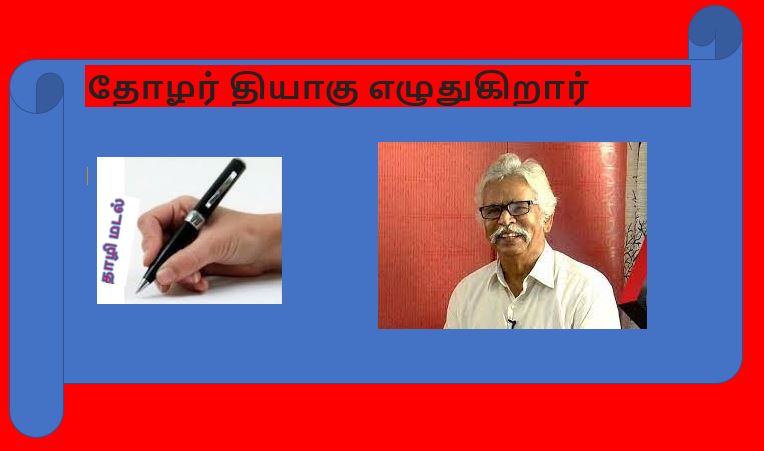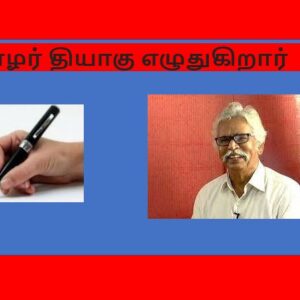தோழர் தியாகு எழுதுகிறார் 67 : ‘மண்டல்’ தீர்ப்பின் சாரம்

(தோழர் தியாகு எழுதுகிறார் 66 தொடர்ச்சி)
‘மண்டல்’ தீர்ப்பின் சாரம்
[பொ.ந.பி. (EWS) இடஒதுக்கீடு பற்றிய நீதியர் இரவீந்திர பட்டு(Ravindra Bhat) தீர்ப்பின் ஒரு பத்தியைத் தாழி 37ஆம் மடலிலும் இன்னொரு பத்தியை 38ஆம் மடலிலும் ஆங்கிலத்திலும் தமிழிலும் வெளியிட்டிருந்தேன். மண்டல் தீர்ப்பு என்று பெயர் பெற்ற இந்திரா சாகுனி(Indra Sawhney) தீர்ப்பின் முகன்மைக் கூறுகளை இரவீந்திர பட்டு தமது தீர்ப்புரையில் சுருக்கித் தொகுத்துக் கொடுத்துள்ளார். சட்ட அறிவிலும் தமிழாக்கப் பயிற்சியிலும் அக்கறையுள்ள அன்பர்களுக்குப் பயன்படும் என்ற நோக்கில் அந்தத் தொகுப்பை இதோ படைக்கிறேன்:-
இட ஒதுக்கீடுகள் குறித்து மிகவும் ஆணித்தரமான தீர்ப்பு என்றால், அது இந்திரா சாகுனி – எதிர் – இந்திய ஒன்றியம் எனும் வழக்கில் ஒன்பது நீதியர் ஆயம் வழங்கிய தீர்ப்புதான். நடுவணரசுப் பதவிகள் பணிகள் தொடர்பில் ஏனைய பிற்பட்ட வகுப்புகளுக்கு ஆதரவாக 27% ஒதுக்கீட்டைக் கொண்டுவந்த அலுவலகக் குறிப்பாணை செல்லுமா என்று நீதிமன்றம் கருதிப்பார்க்கவும் இந்த வழக்கு வாய்ப்பாயிற்று. ஆனால் தீர்ப்பு ஒருமனதானதாக அமையவில்லை. ஆறு கருத்துரைகள் வழங்கப்பெற்றன. அவற்றின் ஆகப் பொதுவான சுருக்கம் இதோ:
(1) 16(4) உறுப்புக்குள் குடிமக்களில் பிற்பட்ட வகுப்புகள் என்ற குறிப்பு சமூக, கல்வி வழிப் பிற்பட்ட நிலையைக் குறிப்பதாகும்;
(2) 16(4) உறுப்பு என்பது 16(1) உறுப்பின் முகப்பும் அதன் ஒரு பகுதியும் ஆகுமே தவிர அதற்கான விதிவிலக்கன்று;
(3) சாதி மட்டுமே சமூக வழியிலும் கல்வி வழியிலுமான பிற்பட்ட நிலையை முடிவு செய்வதற்கான தீர்மானிக்கும் காரணி அன்று. சாதி என்பது இந்தியாவில் ஒரு சமூக வகுப்பாக பல நேரம் இருக்கக் கூடும்;
(4) வகுப்புகள் அல்லது குழுக்களின் பிற்பட்ட நிலையைத் தீர்மானிக்க பொருளியல் அளவை மட்டும் என்பது ஏற்புடையதன்று. 15(4), 16(4) உறுப்புகளை மதிப்பதாயின் சமூக வழியிலும் கல்வி வழியிலுமான பிற்பட்டமையே பிற்பட்ட நிலையைக் காட்டும் குறிமுட்கள் ஆகும்;
(5) பிற்பட்ட வகுப்புகளைச் சேர்ந்த குடிமக்களில் மிகவும் நலிந்த குழுக்கள் பயனடையும் பொருட்டு அவ்வகுப்புகளை உள்வகைப்படுத்தல் ஏற்புடையதே;
(6) 16(4) உறுப்பின் கீழ் பதவியுயர்வுகளில் இடஒதுக்கீட்டுக்கு வாய்ப்பில்லை.
(7) ஏனைய பிற்பட்ட வகுப்புகளில் “பசையடுக்கினர்” அல்லது கூடுதல் வசதியுள்ள பிரிவுகளை அரசு இனங்கண்டால்தான், ஆகப் பெரிதும் வாய்ப்பிழந்த பிரிவுகள் விடுபட்டுப் போகாமல் இருப்பதை உறுதி செய்ய இயலும்..இந்தப் பசையடுக்கு வகையினங்கள் இடஒதுக்கீட்டுக்கு உரிமை கோர முடியாது.
[The most authoritative decision on the point of reservations was the nine- Judge ruling in Indra Sawhney v. Union of India7. The court also had the occasion to consider the validity of an office memorandum which introduced a 27% quota in favour of other backward classes in relation to Central Government posts and services. The verdict was not a unanimous one. There were six opinions. The broadest summary of those opinions:
(1) the reference to backward classes of citizens within Article 16(4) refers to social and educational backwardness;
(2) Article 16(4) is a facet and part of Article 16(1), and not an exception to the latter. The judgment of Jeevan Reddy, J explains the ruling in N.M. Thomas on this point approvingly at paragraph 713 (SCC p. 672-674);
(3) Caste alone cannot be the determining factor to decide social and educational backwardness and that a caste can be and can often be a social class in India;
(4) The economic criterion alone for determining backwardness of classes or groups is impermissible, because the indicators are social and educational backwardness having regard to the express terms of Articles 15(4) and 16(4);
(5) There can be sub-classification amongst backward classes of citizens for the purpose of ensuring that most vulnerable groups benefit;
(6) There can be no reservations in promotions under Article 16(4); and
The creamy layer or more affluent sections of other backward classes had to be identified by the state to ensure that the most deprived sections were not kept out. Such categories could not claim the benefit of reservation. ]
++
சொல்லடிப்போம் வாருங்கள்!
அன்பர் சிபி எழுதுகிறார்: PDF – portable Document Format. கையடக்க ஆவண வடிவம் என்று மொழிபெயர்க்கலாம். எளிமை கருதி கையடக்க ஆவணம் என்று வழங்கலாம்.
நன்றி சிபி!
++
(தொடரும்)
தோழர் தியாகு
தரவு : தாழி மடல் 40



Leave a Reply